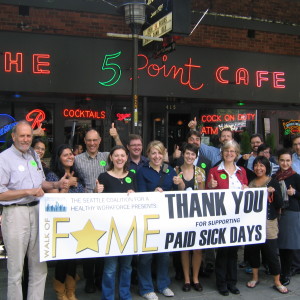
The Seattle Coalition for a Healthy Workforce recognizes the 5 Point Cafe, one of many business supporters during the campaign for the city’s paid sick days ordinance.
When Seattle’s City Council adopted the Paid Sick and Safe Leave ordinance in 2011, it was embarking on new territory. For the first time, the City established a labor standard covering most employers operating within city limits. That precedent and the relatively successful experience of sick leave set the stage for Seattle adopting its own minimum wage in 2014.
The Seattle City Auditor’s just-released report makes a compelling case for more aggressive enforcement of the sick leave law. Since it went into effect in September 2012, the Office of Civil Rights has focused on educating employers and encouraging them to provide paid sick leave in compliance with the law. During 2013, OCR issued 103 advisory letters to employers in response to complaints by workers and assisted workers in recovering $5,835 in lost wages, but undertook no proactive investigations.
Initially it made a lot of sense for the City to take a cautious approach to enforcing the new labor standard. The City Council deserves credit for providing for both the Auditor’s report and an evaluation (contracted out to the UW) in the original ordinance. And OCR staff certainly has done a commendable job with implementation on an extremely limited budget.
We know now that Seattle’s economy has thrived since paid sick days went into effect (despite the dire prediction of opponents that businesses would flee) and that access to sick leave has increased significantly, especially in restaurants. But we also know that too many workers still don’t know their rights, and too many employers are getting away with cheating their workers of paid sick leave.
With flu season underway and public health concerns front and center in the news, it’s certainly time to step up and make sure everyone is getting the paid sick leave they’re entitled to.
Good thing, then, that sick leave did pave the way for a city minimum wage, and that come January, Seattle will have a new Office of Labor Standards. Enforcement staff will increase from one person to seven.
A high profile case or two with substantial penalties against businesses that have been systematically denying workers their rights might be just the right prescription to make healthy, responsible prevention a reality for every worker in Seattle.
More To Read
September 24, 2024
Oregon and Washington: Different Tax Codes and Very Different Ballot Fights about Taxes this November
Structural differences in Oregon and Washington’s tax codes create the backdrop for very different conversations about taxes and fairness this fall
September 10, 2024
Big Corporations Merge. Patients Pay The Bill
An old story with predictable results.
September 6, 2024
Tax Loopholes for Big Tech Are Costing Washington Families
Subsidies for big corporations in our tax code come at a cost for college students and their families
